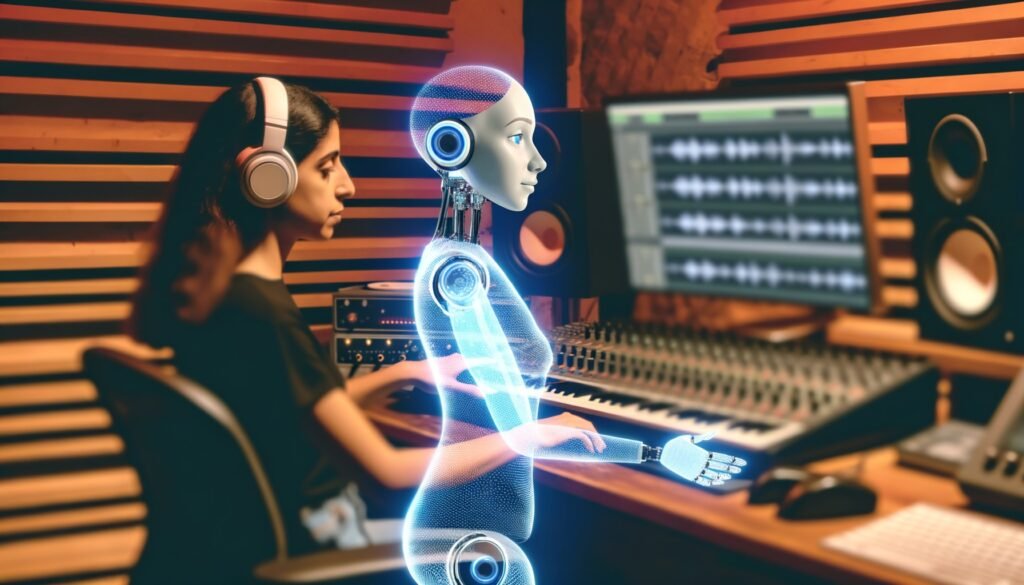Artificial Intelligence (AI) has been steadily transforming industries, from healthcare to finance, but one of its most exciting applications is in the world of music. AI music is redefining how music is created, consumed, and experienced, offering new possibilities for both seasoned musicians and aspiring creators alike. This technology is enabling the automation of music composition, personalized soundtracks, and even new forms of musical expression that were once thought impossible.
In this article, we explore what AI music is, how it works, its impact on the music industry, and the future it holds for creators and listeners.
What Is AI Music?
At its core, AI music refers to music that is either created, assisted, or enhanced by artificial intelligence. AI-powered systems use sophisticated algorithms, machine learning models, and neural networks to analyze patterns in existing music and generate new compositions based on that knowledge. These systems can:
- Compose music across various genres and styles.
- Generate instrumental music or even incorporate vocals.
- Personalize soundtracks for specific uses, such as background music for videos, games, or social media posts.
- Remix or adapt existing tracks to create variations.
AI music tools are designed to imitate human creativity, offering a seamless blend of technology and artistry.
How AI Music Works
AI music tools rely on machine learning algorithms that are trained on vast datasets of music from different genres, historical periods, and cultural contexts. These algorithms analyze essential components like melody, harmony, rhythm, structure, and instrumentation.
Key Components of AI Music Creation:
- Training Datasets: AI models are fed with large collections of musical compositions, learning the patterns that define different musical styles.
- Neural Networks: Advanced AI uses deep learning techniques to identify and replicate the underlying features of music.
- Generative Algorithms: These algorithms are capable of creating new compositions by combining learned patterns in novel ways.
Once trained, AI can compose music based on user inputs like mood, tempo, genre, and even specific instruments. Some AI music tools allow for deep customization, while others generate music autonomously.
Benefits of AI Music
1. Accessibility for Non-Musicians
AI music creation tools are not just for professional musicians—they’re accessible to anyone. Even if you don’t know how to play an instrument or read music, you can generate high-quality, original music. This opens up new creative opportunities for content creators, marketers, and even hobbyists.
2. Efficiency and Speed
Creating music manually can be a time-consuming process, often requiring hours of practice, arrangement, and fine-tuning. AI music tools dramatically speed up this process. You can generate a track in minutes, making it ideal for projects with tight deadlines or when you need quick background music for videos, games, or advertisements.
3. Cost-Effectiveness
Hiring a composer or purchasing expensive licensing rights for music can be costly, especially for small businesses or individual creators. AI music tools provide an affordable alternative, with many platforms offering royalty-free, customizable music that can be used commercially.
4. Creative Inspiration
AI music tools can act as a creative partner. For musicians and composers, these tools can generate ideas, help overcome creative blocks, and even suggest variations on existing compositions. AI can be a source of inspiration, offering new musical directions or providing multiple versions of a piece.
Popular AI Music Platforms
Several companies and platforms are at the forefront of AI music generation. These tools cater to a range of needs, from professional music production to casual content creation:
- AIVA: This AI music generator is designed for professional composers and filmmakers, specializing in orchestral and cinematic music.
- Boomy: A user-friendly platform that allows anyone to create and share music instantly. It’s great for social media creators and independent artists.
- Amper Music: This tool helps creators produce music for video, marketing, and more. Amper focuses on offering customizable, royalty-free music tracks.
- Soundraw: Perfect for video editors and content creators, Soundraw lets you generate unique, emotion-driven tracks based on scenes or visuals.
- Magenta by Google: An open-source project that allows developers to explore AI music generation, from melody creation to full-song compositions.
Applications of AI Music
AI music is having a significant impact on several industries and areas of creativity:
- Advertising and Marketing: AI-generated music is used to create bespoke soundtracks for commercials, videos, and social media campaigns, aligning the sound with the brand’s message and audience.
- Gaming: Video games benefit from adaptive music that changes based on gameplay or player actions. AI-generated music allows for a more immersive experience.
- Content Creation: YouTubers, podcasters, and social media influencers rely on AI-generated music to enhance their content, offering royalty-free tracks that don’t require licensing.
- Film and TV: AI is also becoming an important tool in film and television production, helping to create original scores for movies, TV shows, and documentaries.
- Education: AI music tools are being used in educational settings, teaching students about music theory, composition, and sound production.
Challenges and Ethical Considerations
While AI music has opened up exciting possibilities, it also raises important questions:
- Creativity and Authenticity: Can AI truly create art, or is it simply mimicking patterns from human creativity? Some argue that AI lacks the emotional depth and personal experience that human composers bring to their work.
- Ownership and Copyright: Who owns AI-generated music? The creator of the AI tool? The user who prompted the AI? These legal questions are still being explored and debated.
- Over-Reliance on Technology: There’s concern that over-reliance on AI for music creation could stifle human creativity and originality, leading to homogenized soundtracks and reduced opportunities for professional musicians.
The Future of AI Music
The potential for AI music is immense, and it’s only getting started. As AI systems continue to evolve, we can expect:
- More personalized music that adapts to a listener’s emotional state or activity.
- Enhanced human-AI collaboration, where artists and AI co-create in real time, blending human intuition with machine learning.
- Smarter, more intuitive tools that will allow even the most novice users to compose sophisticated music.
Ultimately, AI music is not about replacing musicians but rather enhancing their ability to innovate and explore new soundscapes. It’s a tool that empowers creators to push the boundaries of what’s possible.
Conclusion
AI music is not just a futuristic concept—it’s here, and it’s transforming the way we create and experience sound. By offering greater access to music creation, speeding up production, and enabling new levels of creativity, AI is opening exciting new possibilities for both seasoned artists and new creators alike. Whether you’re composing for a video game, creating content for your YouTube channel, or simply exploring new ways to make music, AI music tools are becoming an indispensable part of the modern creative toolkit.
As the technology continues to evolve, we can expect AI music to play an even more central role in shaping the soundtracks of our lives.


